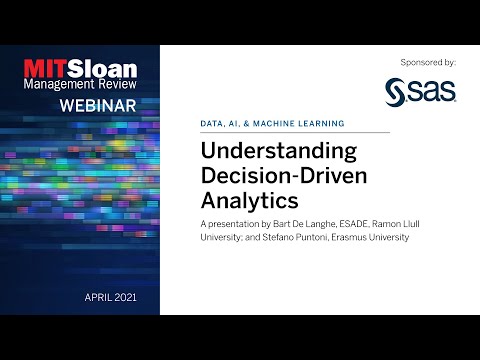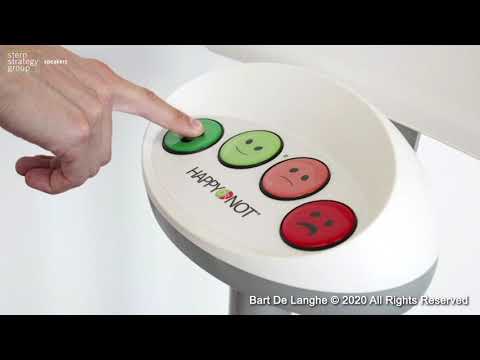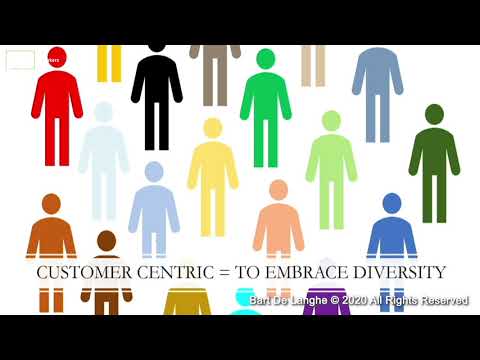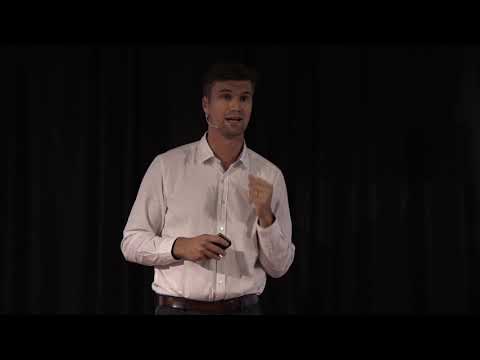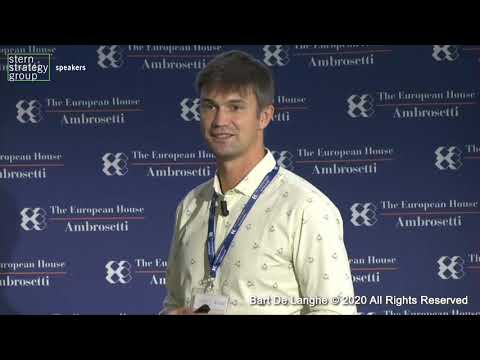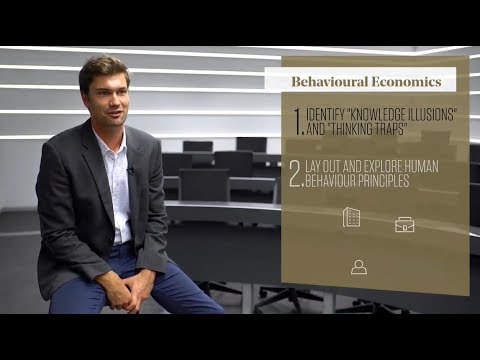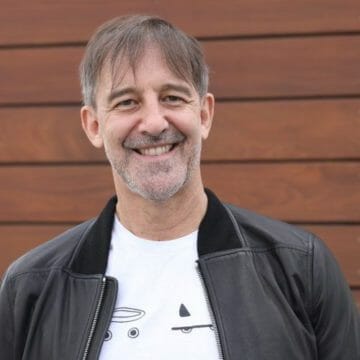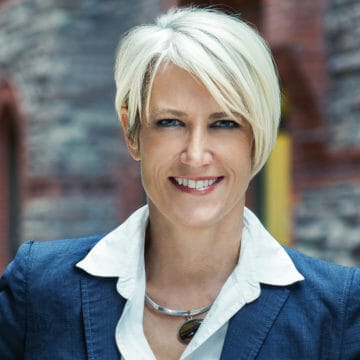Videos
Learn More About Bart De Langhe
To many organizations, decisions based on hard data is an important factor in corporate strategy and one that companies invest in highly. But what if the long held conventional wisdom of starting with data and ending with decisions was turned on its head?
According to acclaimed behavioral scientist and Full Professor of Marketing at KU Leuven and Vlerick Business School in Belgium, Bart De Langhe, Ph.D. (deh-LONG), the most effective way to apply analytics is to put people before data in the process, and start with the decisions that need to be made.
As De Langhe’s research shows, decision-driven analytics brings human intelligence and decision-making to the forefront and allows leaders to drill down to the specific courses of action they’re choosing from. By specifying the available strategic and tactical options from the start, leaders can then identify the data that will be needed to make effective, informed decisions. As more organizations make greater investments in data and technology, De Langhe urges executives not to overlook the power of human intelligence.
“Data, machines and algorithms alone don’t lead to optimal decisions,” he emphasizes. “It’s vital to position human intelligence at the heart of our data analytics and AI strategies.”
When organizations mindfully optimize the respective areas of expertise of humans and artificial intelligence, AI becomes an even more powerful tool.
Outline Desired Outcomes Before Diving Into Data
An expert on the psychology of decision-making, De Langhe’s upcoming co-authored book, “Decision-Driven Analytics: Leveraging Human Intelligence to Unlock the Power of Data” (Wharton School Press, 2024), provides a framework for optimizing strategic business decisions and the data that can point leaders to the most effective choices.
According to De Langhe, by understanding the power of decision-driven analytics, leaders can zero in on solutions to fundamental business problems without being led astray by an abundance of unhelpful historical data.
“The data that is available to a business is oftentimes not the data needed to make more effective decisions,” explains De Langhe, one of 2021’s Poets & Quants Best 40-Under-40 Professors. “By starting with the decision makers, organizations can then determine the data that will be needed in order to make those decisions as opposed to starting with data analysis and trying to push it to be true. That’s simply confirmation bias.”
Apply Human Intelligence to Excel with Artificial Intelligence
To analyze data, there’s now a great allure of new technology and a growing awareness of the constraints of human cognition. This leads many organizations to turn to AI. However, De Lange advises leaders not to undervalue the unique intelligence of the people in their organization. It’s vital, he says, to learn how to decode both human and artificial intelligence. Understanding the respective strengths of each and determining which tasks are best suited for algorithms versus human thinkers allows companies to leverage each to create a more collaborative and productive organization.
“Many companies have shifted their focus towards data and technology, often overlooking the human element and the significance of psychology,” De Langhe explains. “While data is often viewed as unbiased and AI is perceived as a solution to human limitations, it’s crucial to remember that algorithms should be tools in our hands, not replacements for our judgement.”
Through informative presentations and confidential advisory arrangements, Bart De Langhe helps leaders optimize decision-making and analytics, empower human intelligence rather than stifle it, and more clearly understand customer behavior.
His real-world research and case studies, joined together with practical tools and frameworks, better positions organizations to prioritize strategic decisions over big data, bring AI and workers together as collaborators, and better predict what customers will do next to solidify brand loyalty and competitive performance.
###
Bart De Langhe is a Full Professor of Marketing at KU Leuven and Vlerick Business School in Belgium where he teaches courses on the European Executive MBA program, the FMCG Bootcamp for Masters students and the DBA. He also takes part in programs on behavioral economics, data analytics and decision making.
De Langhe’s research examines how consumers and managers make judgments and decisions – and specifically, how they think about data, metrics and statistics. De Langhe has been published in leading academic journals, and his work featured in magazines including Harvard Business Review and MIT Sloan Management Review. In 2017, he was recognized by the Marketing Science Institute as one of the most promising young scholars in marketing, and in 2021, he was selected as one of Poets & Quants’ Best 40-Under-40 Professors.
With a Ph.D. in marketing from Rotterdam School of Management, Erasmus University, Netherlands, De Langhe is a sought-after keynote speaker. He has presented his research at the most prestigious academic institutions in the world. He also supports organizations as both a consultant and non-executive board member.
Bart De Langhe is available to advise your organization via virtual and in-person consulting meetings, interactive workshops and customized keynotes through the exclusive representation of Stern Speakers & Advisors, a division of Stern Strategy Group®.
Outline Desired Outcomes Before Diving Into Data
Is the conventional wisdom of gathering and analyzing data to define strategic decisions the best way to use an organization’s human intelligence and vast amounts of data, much of which may be irrelevant? According to behavioral scientist and marketing professor Bart De Langhe, Ph.D., the data that is available to a business is oftentimes not the data needed to make the most effective decisions, requiring the previous paradigm of starting with data analysis and trying to push it to be true to be turned on its head. Drawing from his upcoming book, “Decision-Driven Analytics: Leveraging Human Intelligence to Unlock the Power of Data” (May 2024), De Langhe explains the power of starting with human intelligence and decision makers then determining the data that will be needed to make those decisions. Audiences will leave with a practical framework for optimizing the interplay between strategic business decisions and the data that will empower leaders to make the most effective competitive choices.
Apply Human Intelligence to Excel with Artificial Intelligence
With the great allure of new technology like artificial intelligence and a growing awareness of the constraints of human cognition, how can organizations supercharge AI through the human intelligence that already exists in the company? In this revealing presentation, KU Leuven and Vlerick Business School Professor Bart De Langhe, Ph.D., explains why it’s crucial to remember that algorithms should be tools in our hands, not replacements for human judgement. According to De Langhe, leaders shouldn’t undervalue the unique intelligence of the people in their organization and instead should leverage AI and human intelligence to complement their respective strengths. Audiences will learn how to understand the unique cognitive assets of machines and people to best determine which tasks are best suited for algorithms versus human thinkers. With this new lens, organizations will be positioned to become more collaborative, productive and competitive with the latest machine learning technology.
Effectively Divide Work Between Humans and Machines to Optimize Growth
Algorithms and humans process information differently. Machines are good at sensing and storing information, while humans are good at decomposing and recomposing information, breaking it down and reconfiguring it in new ways. Working together, they form what KU Leuven and Vlerick Business School Professor Bart De Langhe refers to as “collective intelligence.” In this presentation, De Langhe helps companies understand which tasks are best assigned to machines so humans can do better work and businesses can thrive. He shares his three-step framework and then applies it to strategic decision-making, marketing, innovation, human resources, data analytics and other business functions. He further points out that fears around humans being replaced by AI are unfounded, and illustrates his point with references to the history of art. Audiences will gain from De Langhe a deeper, more accurate understanding of what it will take to succeed in a future that requires the best of both humans and technology.
Gain Customer Loyalty by Reversing Your Product Development Process
Traditionally, companies develop products and services they think will be marketable. KU Leuven and Vlerick Business School Professor Bart De Langhe says this process should be reversed – that winning customers starts with identifying what your valued customer looks like then developing products and services to meet their needs. In this presentation, he reviews the principles of his three-step framework for creating and innovating in response to a specific market and shows how data analytics can help companies paint a picture of what their valued customer looks like. His framework asks companies to learn everything about that customer, find more customers like them and focus on serving that group in order to build business and establish lifetime customer loyalty. During his talk, De Langhe shares relevant case studies then fields questions from attendees looking for insights into their own business challenges.

Decision-Driven Analytics: Leveraging Human Intelligence to Unlock the Power of Data
(Wharton School Press, May 2024)

Circle of Incompetence: Sense of Understanding as an Improper Guide to Investment Risk
(Journal of Marketing Research, August 2018)

Productivity Metrics and Consumers' Misunderstanding of Time Savings
(Journal of Marketing Research, June 2016)

Star Wars: Response to Simonson, Winder/Fader, and Kozinets
(Journal of Marketing Research, February 2016)

Navigating by the Stars: Investigating the Actual and Perceived Validity of Online User Ratings
(Journal of Marketing Research, September 2015)

